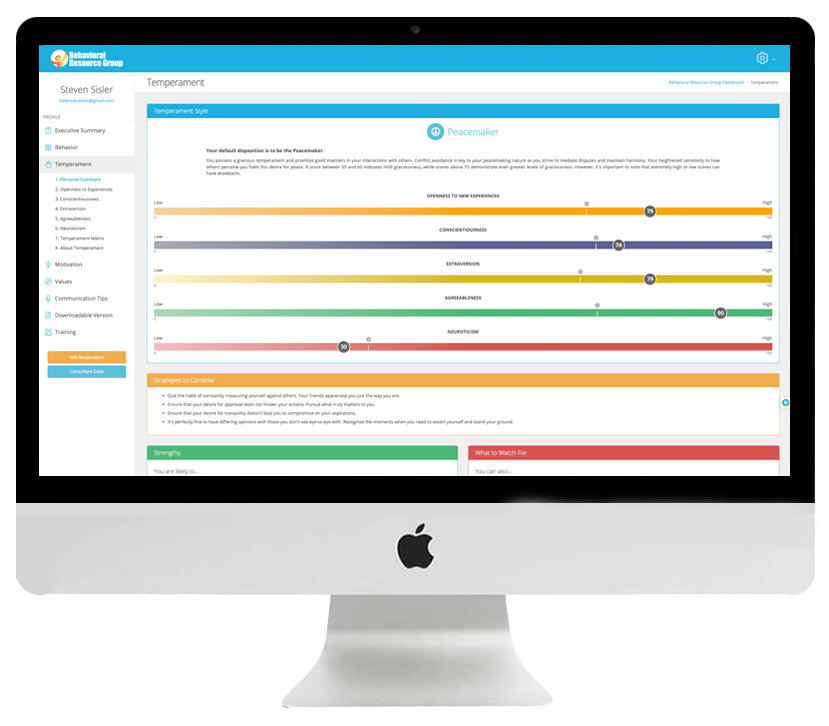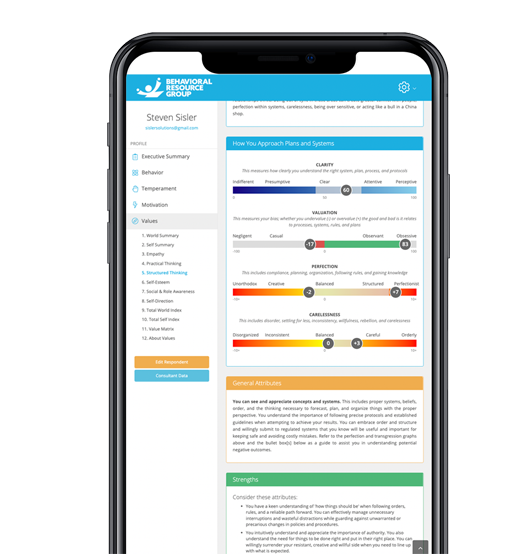Plano, Texas
Get in Touch
Contact Info
-
-
sislersolutions@gmail.com
-
+1 781.298.3387

Temperament Traits (The Big5)
The Big5 assessment measures your "general" temperament strategy (traits). Our version is based on the "duel" temperament model which encompasses a two-part measurement for each item. For example, Openness to Experiences entails both "Intellect" and "Aesthetics."
With this personalized and comprehensive temperament assessment, you have the tools to help you become a better you and help you behave more maturely and productively. Then, you can develop and use more of your natural strengths while recognizing and understanding your limitations. This report concentrates on the 5 general temperaments.
The five general temperament indicators are conscientiousness, extraversion, agreeableness, neuroticism, and openness to experiences. each of these items have two merging properties that when combined, produce the whole of the indicator.
Measurements indicate but are not limited to
- Intellect and Aesthetic
- Industriousness and Orderliness
- Compassion and Politeness
- Enthusiasm and Assertiveness
- Volatility and Withdrawal
- Attitudes
- Hesitancy
- Logic and Emotion
- Carefreeness and Self-Discipline
- Disagreeableness
Integration of Traits
Conscientiousness reflects an individual's tendency to be organized, responsible, and goal-oriented. Those high in conscientiousness exhibit meticulousness in their approach to tasks, demonstrating reliability, self-discipline, and a strong sense of duty. They prioritize long-term goals over immediate gratification, consistently striving for excellence in their endeavors. Conscientious individuals are often perceived as dependable and diligent, excelling in roles that require attention to detail and adherence to deadlines. This trait plays a significant role in shaping an individual's success in both personal and professional domains, as it fosters perseverance, achievement, and a sense of purpose.
Agreeableness encompasses traits such as kindness, empathy, and cooperation. Individuals high in agreeableness tend to be considerate, compassionate, and accommodating in their interactions with others. They prioritize harmonious relationships and value cooperation over conflict, often displaying warmth, altruism, and a willingness to compromise. Agreeable individuals are empathetic listeners who strive to understand and support the needs of those around them, fostering a sense of trust and camaraderie within their social circles. This trait contributes to the development of strong interpersonal bonds and promotes a collaborative and supportive environment in both personal and professional relationships.
Neuroticism pertains to the tendency to experience negative emotions such as anxiety, sadness, and irritability. Individuals high in neuroticism are more prone to experiencing emotional instability and may react strongly to stressors, exhibiting mood swings and heightened sensitivity to perceived threats. They often ruminate over past events and worry excessively about future outcomes, leading to feelings of insecurity and self-doubt. Conversely, those low in neuroticism tend to be more emotionally resilient, maintaining a stable and optimistic outlook even in challenging situations. This trait influences various aspects of an individual's life, including their coping mechanisms, interpersonal relationships, and overall well-being.
Extraversion characterizes individuals who are outgoing, sociable, and energetic. Those high in extraversion thrive in social settings, enjoying interactions with others and seeking out stimulating experiences. They are typically assertive, talkative, and enthusiastic, often taking center stage in group settings and readily engaging in conversation. Extraverts draw energy from external stimuli and are known for their gregarious nature, which fosters a wide network of social connections and opportunities for collaboration. Conversely, introverts, who fall on the lower end of the extraversion spectrum, tend to prefer solitude and quieter activities, replenishing their energy through introspection and reflection. Extraversion influences various aspects of an individual's life, including their social interactions, career choices, and overall satisfaction with life.
Openness encapsulates traits such as creativity, curiosity, and receptiveness to new experiences. Individuals high in openness exhibit a broad range of interests and a penchant for exploration, embracing novelty and unconventional ideas with enthusiasm. They are imaginative thinkers who appreciate art, diversity, and intellectual stimulation, often seeking out opportunities for learning and personal growth. Open individuals are inclined towards unconventional perspectives and are unafraid to challenge established norms, fostering innovation and adaptability in various domains. Conversely, those low in openness tend to be more traditional and cautious, preferring familiarity and routine over novelty and experimentation. Openness influences an individual's creativity, adaptability, and overall engagement with the world around them, shaping their approach to life's opportunities and challenges.
Want to give it a test drive?

